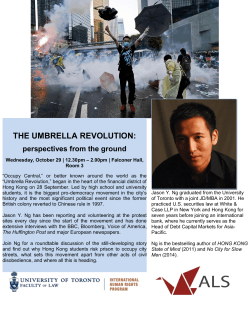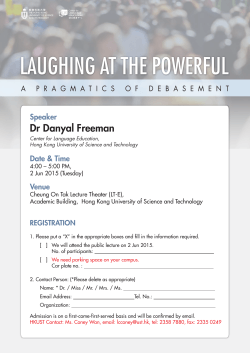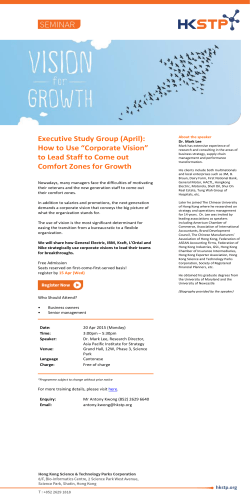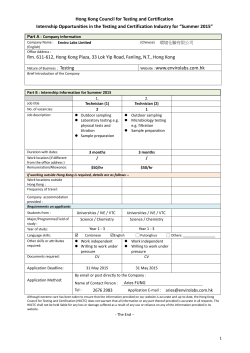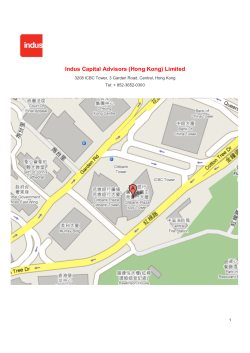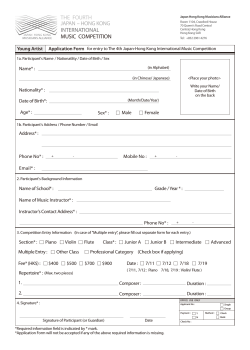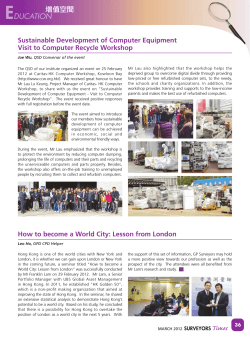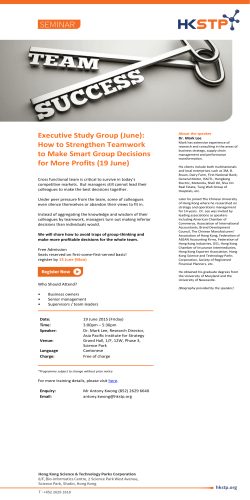
htlae H - Master of Public Health
Environmental Health Technology LEVERAGE YOUR SUMMER LEARN F ROM G LOBAL E XPERTS Epidemiology Policy Social Determinants Social justice Health 2015 Community Inequalities Healthy Lifestyle Public-private Resources Transmission Systems H E A L T H Surveillance P U B L I C Healthcare I N Infectious disease control SUMMER SEMESTER Nations Response The University of Hong Kong SUMMER SEMESTER IN PUBLIC HEALTH The School of Public Health of the University of Hong Kong offers short courses in public health each year in collaboration with internationally renowned scholars. Individuals interested in a special area of public health are welcome to join to gain an interactive, challenging and rewarding postgraduate learning experience. Participants who have successfully completed a module may be awarded CME/CPD points or advanced credit should they wish to enroll in the Master of Public Health programme. Summer Semester (April – August) Module Code Module Name Day CMED 6401 Advanced clinical epidemiology and decision analysis Tuesday (April – July) CMED 6202 The practice of public health 6-30 May CMED 6909 Comparative health systems: Hong Kong and the United States 4-13 May CMED 6040 Advanced statistical methods II Friday (May – Aug) CMED 6910 Strategic management in healthcare Saturday (PM) CMED 6030 Advanced epidemiological methods Monday & Thursday (June) CMED 6903 Resources for health Saturday (June – July) CMED 6915 Public health leadership Saturday (June – August) CMED 6050 Advanced epidemiological methods II 12-18 July CMED 6219 Health communication 3-8 August The course timetable is subject to change without prior notice. Interested parties please check the timetable online or contact us for any updates: http://mph.sph.hku.hk/en/current_students/timetable.html#summer_2015 . (May – July) G LOBAL PUBLIC HEALTH POLICY CMED 6909 Credit 1 COMPARATIVE HEALTH SYSTEMS: HONG KONG AND THE UNITED STATES Coordinator(s) Prerequisites Prof SH Kagan, University of Pennsylvania, US None The major aim of this course is to provide a comparative view of aging, public health, and allopathic, traditional and complementary treatment in Hong Kong and The United States within the perspectives of nursing, medicine, and interdisciplinary collaboration. Classroom experiences are designed – both in the U.S. and in H.K. – to build knowledge of how the U.S. and H.K. compare in demographics and aging; health, disease, and illness; and healthcare treatment from prevention through rehabilitation and palliation. Collaboration between nurses and physicians is emphasized throughout the course, in interaction with the faculty team, in home seminars and clinical observations, and in the seminars and clinical observations in Hong Kong. Clinical experiences include observation in a collaborative practice in the U.S. and in a variety of settings across the SAR of Hong Kong. All of these experiences will be reflected against the student’s broader knowledge of the U.S. healthcare system and care delivery settings but do not require specific clinical background to achieve the objective of the course. CMED 6202 PRACTICE CMED 6903 Credit 1 RESOURCES FOR HEALTH Coordinator(s) Prerequisites Prof JR Lu, Chang Gung University, Taiwan • CMED 6900 Health policy and politics This module analyses the origins and flow of financial resources through the entire health system, in a tri-axial fashion, in that what is consumed has been provided and financed. Therefore, money is traced from revenue sources to agents in financing schemes, to provision influenced by different factors of production (including operating cost structure and capital formation), to consumption by different beneficiaries resulting in observed utilisation patterns. In parallel, students learn about the critical importance of non-financial resources, i.e. human resources, in the production of healthcare. The planning process for, production, deployment (including substitution), retention and continuous development of different types of healthcare professionals are illustrated. Special mention is also made of other possible resource constraints to optimal system functioning. Finally common indicators to evaluate health system performance, with particular emphases on financing and human resources, are used to assess various prototypic examples drawn from empirical experience locally and elsewhere. Credit 1 THE PRACTICE OF PUBLIC HEALTH Coordinator(s) Prerequisites AND CMED 6915 Dr YH Tam None PUBLIC HEALTH LEADERSHIP The content of this module aims to promote the application of public health sciences to a wide range of common problems and issues. Each session will include one or more problems which can be used to illustrate the wide range of disciplines applicable (from an evidence- based perspective) to the practice of public health. CMED 6219 Credit 1 Credit 1 Coordinator(s) Prerequisites Dr Ric Roi and Ms Deirdre Lander • CMED 6901 Principles of healthcare management • Previous healthcare work experience This module focuses on the challenges of managing complex healthcare systems. It explores the leadership and motivational skills acquired by effective leaders, and discusses the different roles associated with managing the individual, the unit, the organization, and the larger system. HEALTH COMMUNICATION Coordinator(s) Prerequisites Dr K. “Vish” Viswanath, Harvard School of Public Health None The module covers the development of public communication campaigns in the field of health promotion. Students will explore how the mass media can be used to promote health; design mass media messages that are consonant with principles of behavioural science and the public health model; and determine a strategic plan for an integrated mass media campaign. CMED 6910 Credit 1 STRATEGIC MANAGEMENT IN HEALTHCARE Coordinator(s) Prerequisites Dr A Ng, McKinsey & Company HK • Previous healthcare work experience This module aims to introduce different conceptual frameworks and methodologies required to develop sustainable strategies for organisations in healthcare – including but not limited to governmental organisations, NGOs, hospitals/clinics, pharmaceutical companies, medical device companies. LEVERAGE YOUR SUMMER LEARN ADVANCED STUDY IN HODS ANALYTICAL METHODS CMED 6401 Credit 1 ADVANCED CLINICAL EPIDEMIOLOGY AND DECISION ANALYSIS Coordinator(s) Prerequisites Pre-/Co-requisite PRACTICE CMED 6050 Credit 1 ADVANCED EPIDEMIOLOGICAL METHODS II Coordinator(s) Pre-requisite Dr IOL Wong • CMED 6200 Introduction to epidemiology • CMED 6100 Introduction to biostatistics • CMED 6400 Evidence-based practice: an introduction to clinical epidemiology and decision analysis This is an intermediate/advanced-level module on methods of clinical epidemiology and decision science. It covers the techniques and growing range of applications of decision analysis and cost effectiveness analysis in healthcare technology assessment, health policy analysis, medical decision making, and health resource allocation. Students will learn to apply methods that are currently used at the frontiers of clinical epidemiology and decision science research in clinical and public health settings. While the primary emphasis is not mathematical theory, a certain amount of theoretical background is presented for each topic. CMED 6030 FOR Credit 1 Dr E Tchetgen Tchetgen • CMED 6200 Introduction to epidemiology • CMED 6030 Advanced epidemiological methods This course will provide an in depth investigation of statistical methods for drawing causal inferences from observational studies. Informal epidemiologic concepts such as confounding, comparability, intermediate variables, total effects, controlled direct effects, natural direct and indirect effects for mediation analysis, and selection bias will be formally defined within the context of a counterfactual causal model. Methods for estimating a total causal effect in the context of a point exposure will be discussed, including regression methods, propensity score techniques and instrumental variable techniques for continuous, discrete or binary outcome. Mediation analysis will be discussed from a counterfactual perspective, which methods for making inferences about the joint effects of time-varying exposures in the presence of time dependent covariates that are simultaneously confounders and intermediate variables will be emphasized. These methods include g-estimation of structural nested models, inverse probability weighted estimators of marginal structural models, and g-computation algorithm estimators. As a practical, students will reanalyse data sets using the above methods. ADVANCED EPIDEMIOLOGICAL METHODS Coordinator(s) Prerequisites Dr CM Schooling • CMED 6200 Introduction to epidemiology The overarching conceptual framework for this course centres on the counterfactual definition of a cause, specifically how this definition is incorporated into observational study design, analysis and interpretation of results, and ultimately our ability to make causal inference. This course will consider how directed acyclic graphs, mediation analysis, structural equation modelling, multi-level models and different study designs, including Mendelian randomization, can be applied to the pursuit of making valid causal inferences in epidemiology. It will also consider sources of bias and their potential impact. CMED 6040 Credit 1 ADVANCED STATISTICAL METHODS II Coordinator(s) Prerequisites Dr Eric Lau • CMED 6100 Introduction to biostatistics • CMED 6020 Advanced statistical methods I This course will provide a basic, yet thorough introduction to the probability theory and mathematical statistics that underlie many of the commonly used techniques in public health research. The frequentist and Bayesian approaches to parameter estimation, interval estimation and hypothesis testing will be compared and contrasted. The open-source software package R will be introduced, and used to perform analyses. R also includes a powerful graphics engine which will be used to produce publication-quality figures. All theoretical material will be motivated with problems from epidemiology and public health. All the modules are eligible for credit in the Master of Public Health, Postgraduate Diploma and Postgraduate Certificate in Public Health programmes offered by the University of Hong Kong. Individual modules are accredited for CME/CPD points in Hong Kong. F ROM G LOBAL EX PERTS HKU LI KA SHING FACULTY OF MEDICINE 香港大學李嘉誠醫學院 Queen Mary Hospita l 瑪麗醫 院 Pokfulam Road 薄扶林道 Madam S H Ho Residenc e 道 中醫藥學院 HKU Li Ka Shing Faculty of Medicine 香港大學李嘉誠醫學院 te 沙宣 C lo se d Roa oon Sass 白文信 樓 School of Chinese Medicine School of Public Health 公共 生學院 5/F, William MW Mong Block, 21 Sassoon Road 沙宣道二十一號蒙民偉樓五樓 羅富國徑 Patrick Manson Buildin g 何善衡夫人堂 No co rth Laboratory Bloc k 實驗室 樓 William MW Mong Bloc 蒙民偉樓 Bus Routes (Queen Mary Hospital) 巴士路線(瑪麗醫院) No. 4, 7, 37, 40, 40M, 46X, 71, 90B, 91, 94, 970, 970X, 973 Minibus Bus Routes (Sassoon Road) 小巴路線(沙宣道) No. 8, 28 Fee HK$8,000 per module Application Complete “Application Form” downloadable at http://mph.sph.hku.hk/en/prospective_students/form/MPH_Form_ Occasional_2014.pdf Make cheque payable to The University of Hong Kong Send the above to School of Public Health, The University of Hong Kong 5/F William MW Mong Block, 21 Sassoon Road, Hong Kong (Application for summer postgraduate courses) Application deadline Two weeks before the module commences Class venues All classes are held on Medical Campus, 21 Sassoon Road, Pokfulam, Hong Kong Enquiry Tel: (852) 3917 9140 Email: [email protected] Fax: (852) 2855 9528 Website: http://mph.sph.hku.hk k
© Copyright 2026
